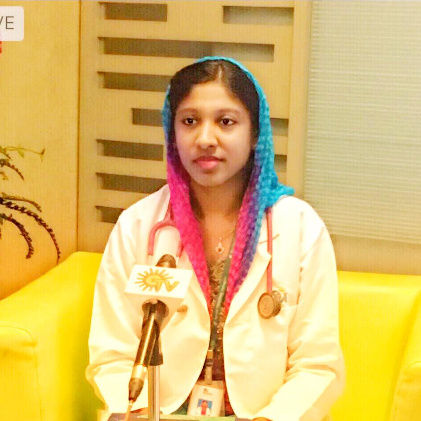Essential Physician Advice for Effective Patient Care
Discover essential physician advice, from accurate diagnosis to effective patient communication. Learn key guidelines for healthcare providers and strategies to deliver quality medical care.

Written by
Last updated on 3rd Jul, 2025
Doctors are trained professionals who diagnose, manage, and treat diseases across diverse patient populations. Their responsibilities include patient assessments, identifying conditions, recommending treatments, and providing ongoing care in various medical fields, such as internal medicine, paediatrics, surgery, psychiatry, and emergency medicine.
This article explores the key aspects of physician advice, its role in healthcare, common challenges in medical counselling, and how to customise advice for individual patient needs.
Importance of Physician Advice
Medical consultation is one of the most crucial healthcare system components, affecting a patient’s condition and the healthcare organisation's performance.
Physician guidance serves dual purposes. It educates patients while maximising the use of available medical resources.
Physician recommendations enable patients to diagnose their condition efficiently, make sound behavioural decisions to avoid diseases, and follow through on treatment regimens, translating to planned, healthier lives.
From a healthcare system perspective, a physician’s advice affords tremendous cost savings, which can be achieved through early diagnosis of diseases and subsequent prevention of complications.
This approach relieves the health system from overloading yet preserves quality healthcare delivery to patients.
Medical consultation is even more influential in patient status change, health prognosis, and incidence of morbidity.
Adequate medical management by physicians results in timely interferences with disease progression and affords measures against complications.
Key Areas of Physician Advice
Physician advice comprises three main areas and is the cornerstone of patient care. Doctors use a systematic approach when diagnosing a patient’s condition and envisioning treatment paths.
They analyse the patient's history of diseases and physical condition and study symptoms requiring diagnosis, examinations, and tests. This process involves systematic evaluation of the individual symptoms presented, the patient's health history, and the results of the tests conducted to arrive at an accurate diagnosis and correct choice of intervention.
The second critical area includes medication management, through which physicians use research-based guidelines to dispense and supervise medication use. This includes risk assessment of interactions with other medicines and potential adverse effects. It also covers individual elements that require a thorough explanation of proper usage and compliance with guidelines when administered. Doctors constantly assess the efficacy of administered drugs and suitably modify prescriptions for therapeutic benefits.
The third subarea focuses on lifestyle and preventive measures. Doctors recommend healthy behaviours, such as proper eating habits, regular exercise, and stress reduction. Doctors also advise relevant screenings based on the patient's risk factors.
Effective Communication with Patients
Physician-patient communication is key to the effective delivery of quality healthcare. Patient interactions should be based on trust, a positive attitude, listening skills, empathy, and uncomplicated language.
Doctors should show genuine concern for patients and set professional boundaries. This can encourage patients to voice issues and ask questions.
The other area of medical communication is patient education. It entails describing diseases, their management, and ways of preventing them and explaining disorders and their cures.
Doctors employ diagrams where possible, give their patients handouts to refer to if they have any, and acquaint them with the purpose and need for specific medical advice.
By providing information specific to the patient, physicians can increase treatment adherence and improve patient involvement in healthcare.
Challenges in Providing Physician Advice
Medical practitioners often struggle to deliver adequate consultation and care, especially when treating patients with complicated illnesses. These cases often involve multiple diseases, complaints, or rare disorders.
Most often, these cases involve multi-disciplinary planning between specialists and extensive patient surveillance. This occurs alongside the complexity of polypharmacy and possible drug interactions.
This is compounded when dealing with patients with coexisting illnesses or diseases. Additionally, when patients present in an atypical manner, it becomes difficult to follow standard conventional protocols.
Compliance can be regarded as another significant issue. It acts as the source of various problems, such as patients’ health illiteracy, financial conditions, and cultural differences.
Treatment non-compliance can be costly in terms of overall health rehabilitation. Medical strategies must find new ways to keep patients committed to their treatment regimens.
It usually involves tackling predisposing social determinants. This may also include streamlining the treatments by reducing the dose frequency and providing other forms of patient counselling and close follow-up.
Physicians must overcome these difficulties by restricting time for specific appointments. This requires them to communicate effectively and ensure their patients receive comprehensive treatment.
It also means meeting acute patient expectations for care. Physicians must address chronic health needs and keep up with rapidly changing information regarding health and disease treatment.
The Role of Technology in Physician Advice
Technology is significantly involved in patient care, especially improving the physician’s advice mechanism.
Telemedicine and virtual consultations are increasingly replacing traditional in-person visits.
Video consultations, monitoring, and health tracking offer convenient alternatives. This has been especially beneficial for patients in remote areas or with physical disabilities, allowing quicker access to medical care and treatment.
Advanced Electronic Health Records (EHRs) have revolutionised healthcare services. They allow physicians to access complete patient details, medical history, test results, and treatment plans.
This digital structure improves decision-making, reduces the symptoms of medical negligence, and fosters better coordination between different clinicians.
Mobile devices and wearable tech provide continuous patient monitoring. These tools deliver timely health data, allowing quick detection and treatment of potential issues.
Ethical Considerations in Physician Advice
Patient confidentiality is one of the biggest challenges in healthcare. It involves more than just non-disclosure of patient information. It also includes protecting electronic medical records and ensuring proper care when sharing information between healthcare providers.
Being informed and making shared decisions are also central ethical features. Physicians must explain treatment options, side effects, and outcomes in simple terms for patients to understand.
This process ensures that patients understand their disease states and treatment options and honour their rights to self-determination throughout the treatment process.
Applying these ethical principles is not always easy. It requires a present-measure approach when there are many management strategies, or the patient’s wishes may not be in their best interest.
Continuous Professional Development
Continuing professional development (CPD) is essential for healthcare professionals to stay updated in a rapidly changing field.
Physicians keep abreast of medical progress through research, conferences, articles, and accredited training programs.
CPD is offered through various formats, including formal training, online resources, and peer interactions.
Doctors use self-assessments to identify areas of improvement and deepen their knowledge. CPD not only meets licensure requirements but also enhances clinical skills, informs decisions, and supports career growth.
High-quality CPD programs help physicians provide optimal care while refining their expertise.
Tailoring Advice to Individual Patient Needs
Cultural competence care uses clinical and cultural data to deliver patient-centred treatment plans because medical advice is personalised for each patient.
From a medical standpoint, simply taking histories and assessing patient compliance is not enough.
Cultural competence must account for the cultural and personal beliefs that influence patient care.
It involves understanding, or at the very least respecting, diverse perceptions of health, disease, and treatment.
Cultural competency is vital as it reflects a commitment to providing care for patients from different backgrounds.
Patient-centred care plans blend scientific practices with individual patient characteristics, adjusting standard treatments to align with patients’ preferences while achieving therapeutic goals.
Conclusion
Successful physician consulting relies on professional expertise, cultural sensitivity, and access to advanced medical facilities. Ethical practices and strategies tailored to individual patient characteristics help build strong relationships and deliver effective care.
This approach ensures that patients feel understood and respected and are more likely to engage in their treatment plans.
Consult Top General Physicians
Consult Top General Physicians

Dr. Chethan T L
General Physician/ Internal Medicine Specialist
5 Years • MBBS, MD, DNB (General Medicine)
Bengaluru
Apollo Medical Center, Marathahalli, Bengaluru

Dr. Rajib Ghose
General Practitioner
25 Years • MBBS
East Midnapore
VIVEKANANDA SEBA SADAN, East Midnapore

Dr. Ramya Hari
General Practitioner
18 Years • Medical Head & Family Physician, DG Shipping Approved Doctor, Panel Physician - UK Visa Medicals
Chennai
Apollo Medical Centre Kotturpuram, Chennai

Dr. Afreen Banu Khan
General Physician/ Internal Medicine Specialist
8 Years • MBBS, DDM (Diab). FCC (Cardio)
Chennai
Apollo Speciality Hospitals OMR, Chennai

Dr Vinay Kumar A V
Nephrologist
8 Years • MBBS, MD - General Medicine, DM - Nephrology
Bilaspur
Apollo Hospitals Seepat Road, Bilaspur




